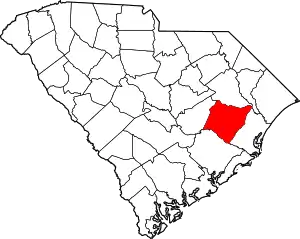Kingstree, South Carolina | |
|---|---|
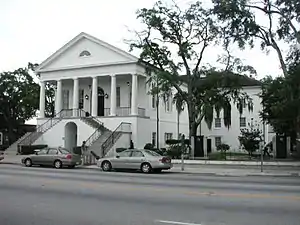 Williamsburg County Courthouse | |
 Seal | |
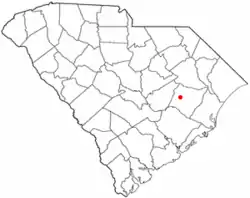 Location in Williamsburg County, South Carolina | |
| Coordinates: 33°40′16″N 79°49′43″W / 33.67111°N 79.82861°W | |
| Country | United States |
| State | South Carolina |
| County | Williamsburg |
| Government | |
| • Type | Mayor–council government |
| • Mayor | Darren Tisdale |
| Area | |
| • Total | 3.20 sq mi (8.30 km2) |
| • Land | 3.18 sq mi (8.24 km2) |
| • Water | 0.02 sq mi (0.06 km2) |
| Elevation | 62 ft (19 m) |
| Population | |
| • Total | 3,244 |
| • Density | 1,020.13/sq mi (393.85/km2) |
| Time zone | UTC−5 (EST) |
| • Summer (DST) | UTC−4 (EDT) |
| ZIP code | 29556 |
| Area code(s) | 843, 854 |
| FIPS code | 45-38590[3] |
| GNIS feature ID | 1246255[4] |
| Website | www.kingstree.org |
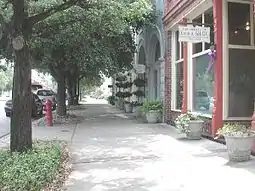
Kingstree is a city and the county seat of Williamsburg County, South Carolina, United States.[5] The population was 3,328 at the 2010 census.[3][6]
History
The original town was laid out as Williamsburg by the Lords Proprietors in colonial times, but a lone, unusually large white pine was found along the Black River. Since tall white pines were ideal for use as masts for ships, it was claimed by the Crown on behalf of the king. The broad arrow mark was carved into the tree to prevent any colonists from cutting it. Though white pines are native to the Appalachians as far south as Georgia, it is the only tree of King George’s ever found in the South.[7]: 166 Over time, the county kept the name Williamsburg, but the county seat became known as the King's Tree.[8]
Battles
Battle of the Lower Bridge
General Francis Marion, known as the Swamp Fox, defeated the British at the Battle of the Lower Bridge in March 1781. A historical marker between US Highway 521 and the Black River denotes the battle.[9]
Battle of King's Tree
After the British had captured Charles Town during the revolution, General Marion gained supporters from Major John James. The Battle of King's Tree took place on August 27, 1780. The city sustained losses, including Indiantown Presbyterian Church being burned to the ground.[8]
Historical homes and buildings
The Kingstree Historic District, M.F. Heller House, Colonel John Gotea Pressley House, Scott House, and Thorntree are listed on the National Register of Historic Places.[10]
Williamsburg Presbyterian Church
Williamsburg Presbyterian Church was founded in August 1736. The church consisted of three structures. Its founders built the first church in 1738 across from the Williamsburg Cemetery in town; the second building was constructed in 1828 and was across from the Williamsburg Cemetery as well. The third, the current structure of the church located on North Academy Street was built in 1914. The stained glass windows on the roof of the church today were imported from Austria. One of the stained glass windows on the roof was removed in 1989 during a renovation and was placed behind the pulpit of the sanctuary.[11] The first person to be buried in the church cemetery was John Witherspoon(1670–1737), the father of James Witherspoon, builder of Thorntree.[12]
Williamsburg Presbyterian Church celebrated its 275th Birthday in October 2011. The church held a service to share Kingstree's history. The church is the oldest church that still exists today between the Santee and Cape Fear Rivers in North and South Carolina. Williamsburg Presbyterian is the mother church to 33 other Presbyterian churches. Two daughter churches include nearby Union Presbyterian church in Salters, South Carolina, and Indiantown Presbyterian Church in Williamsburg County.[13]
The Kingstree company formed at Williamsburg Presbyterian Church's original churchyard in July 1780. The company was led by Captain Henry Mouzon and later turned into the battalion and then formed a brigade led by Francis Marion against the British.[7]: 135
The Arnette House
The Arnette House is one of the three oldest homes in the town and was built in 1840. The home holds significance in the town because the dining room was used as a school for two periods of history during the early years of the home.[11]
Thorntree House
Thorntree House is the oldest home in the lowcountry area of South Carolina. The early plantation home was constructed from native materials of South Carolina. James Witherspoon built the home in 1749 when the house was located six miles outside of town near where the Battle of the Lower Bridge took place. Witherspoon was a part of Francis Marion's brigade. After Witherspoon's death, Witherspoon's son inherited the plantation home.[14] The British occupied the home during the revolution when it was at its original location, on the Black River. Gavin Witherspoon was the owner at the time.[14] The house was later moved to its current location in 1969 when it was being restored by the Williamsburg Historical Society and is currently registered by the National Historic Register.[11] The Williamsburg Historical Society moved the house into Kingstree city limits to provide protection by the city's police and fire department.[14]
Williamsburg County Courthouse
The Williamsburg County Courthouse is located in the business district of Kingstree on Main Street.[12] The original grounds of where the courthouse stands were the original parade grounds in the town of Kingstree and were used by the militia during the revolution. The courthouse was built in 1823 by Robert Mills, a nationally known architect who hailed from South Carolina.[14] The second level of the courthouse suffered a fire in 1883 but because the walls were 30 inches thick and fireproof, the building was restored. Other changes and additions were added to the courthouse including in parking for horses in 1901, and a third floor in 1954.[14]
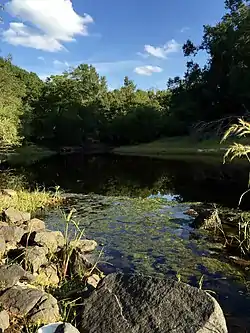
Geography
Kingstree is located at 33°40′16″N 79°49′43″W / 33.67111°N 79.82861°W (33.671243, −79.828635).[15]
According to the United States Census Bureau, the town has a total area of 3.2 square miles (8.3 km2), of which 3.1 square miles (8.0 km2) are land and 0.04 square miles (0.10 km2) (0.63%) is covered by water.
Rivers
The Black River is a free-flowing river surrounded by banks of undisturbed land. The river has habitats suitable for endangered species, including the American chaffseed and the swallow-tailed kite. The black color of the river comes from tannins from cypress trees. The river draws sportsmen because of the variety of fish, including bream, red-breasted sunfish, largemouth bass, and catfish.[14]
The Williamsburg County Hometown Chamber Quality of Place Committee was able to get the South Carolina Department of Natural Resources to include a 75-mile stretch of the Black River in the Scenic River Program in 2001. The Black River is one South Carolina's longest rivers and was the seventh addition to the Scenic Rivers.[14] The river is 150 miles long and goes through Williamsburg, Clarendon, Sumter, and Georgetown Counties in South Carolina.[16]
Demographics
| Census | Pop. | Note | %± |
|---|---|---|---|
| 1880 | 384 | — | |
| 1890 | 539 | 40.4% | |
| 1900 | 760 | 41.0% | |
| 1910 | 1,372 | 80.5% | |
| 1920 | 2,074 | 51.2% | |
| 1930 | 2,392 | 15.3% | |
| 1940 | 3,182 | 33.0% | |
| 1950 | 3,621 | 13.8% | |
| 1960 | 3,847 | 6.2% | |
| 1970 | 3,381 | −12.1% | |
| 1980 | 4,147 | 22.7% | |
| 1990 | 3,858 | −7.0% | |
| 2000 | 3,496 | −9.4% | |
| 2010 | 3,328 | −4.8% | |
| 2020 | 3,244 | −2.5% | |
| U.S. Decennial Census[17][2] | |||
2020 census
| Race | Num. | Perc. |
|---|---|---|
| White | 767 | 23.64% |
| Black or African American | 2,255 | 69.51% |
| Native American | 14 | 0.43% |
| Asian | 69 | 2.13% |
| Pacific Islander | 48 | 0.04% |
| Other/Mixed | 88 | 2.71% |
| Hispanic or Latino | 51 | 1.57% |
As of the 2020 United States Census, there were 3,244 people, 1,414 households, and 725 families residing in the town.
2010 census
According to the census[3] of 2010, there were 3,328 people.[6] The racial makeup of the town was 28.5% White, 70.3% African American, 0.1% Native American, 0.4% Asian, and 0.5% from Hispanic or Latino of any race according to the 2000 census. There are 5857 housing units and 88.6% of the units are occupied and 74.7% are owner-occupied units.[6]
In the town, the population was widely distributed by age, with 27.7% under the age of 18, 70.3% who were 18 years of age and older, 13.2% who were 65 years of age or older. The median age was 34.3 years. There were 932 people or 10.8% of people that held a college or graduate degree, and 2,667 people held a high school degree.[6]
Education
Kingstree has a public library, a branch of the Williamsburg County Library system.[19]
Notable people
- Maxine Brown – blues and R&B singer
- Mary Gordon Ellis – first woman elected to the South Carolina legislature, was born nearby and raised in Kingstree[20]
- Joseph L. Goldstein – Nobel Prize winner
- Uhuru Hamiter – American football player
- John Mack - civic leader
- Bryant McFadden – NFL cornerback for the Pittsburgh Steelers
- Yancey McGill – former Lt. governor of South Carolina
- Wesley Mouzon - professional boxer
- Teddy Pendergrass – R&B singer
- Thomas D. Singleton – United States Representative from South Carolina
- Stephen Atkins Swails – soldier and politician
- JoAnn Haysbert – first female president of Langton University, first female university or college president in the state of Oklahoma
- Rollee McGill – R&B Singer, musician, saxophone player
- Henry N. Tisdale (born 1944), American academic administrator, educator, and mathematician[21]
- Carol Connor – first female circuit court, appeal court, and supreme court judge in South Carolina.[22][23]
- Louise Fulton - professional bowler[24]
- Clifton Newman - South Carolina circuit court judge and former prosecutor, presided over numerous high-profile cases[25]
Festivals
Kingstree Pig Pickin' Festival
The "Pig Pickin'" Festival is held every fall for all the chefs of Kingstree to compete in a barbecue recipes. The festival draws crowds from all over to test the Williamsburg County vinegar-based barbecue.[26] In 2010, the festival had a record breaking number of contestants. Seventy groups competed with contestants that traveled from other states including North Carolina and Georgia. The area golf course, Swamp Fox Golf Course, sponsors a golf tournament to begin the events every year for the festival.[27] Other events include tennis tournaments, car show, arts and crafts, food venders, live music, and activities for children.[28]
Kingstree Trials
Since 1996, the Williamsburg Hometown Chamber has sponsored "The King's Tree trials" for those in the Kingstree community. The races take place at the McCutchen training center which is the home of Deborah and Bobby McCutchen in the Cedar Swamp area on a weekend in November. Jockeys and their horses are brought in for the event.[8] Horse racing has been taking place in Williamsburg County since before the Revolution. Nine quarter races take place while families and people from the business community chat and eat barbecue.[29]
See also
References
- ↑ "ArcGIS REST Services Directory". United States Census Bureau. Retrieved October 15, 2022.
- 1 2 "Census Population API". United States Census Bureau. Retrieved October 15, 2022.
- 1 2 3 "U.S. Census website". United States Census Bureau. Retrieved May 14, 2011.
- ↑ "US Board on Geographic Names". United States Geological Survey. October 25, 2007. Retrieved January 31, 2008.
- ↑ "Find a County". National Association of Counties. Archived from the original on May 31, 2011. Retrieved June 7, 2011.
- 1 2 3 4 "2010 Demographic Profile: SC-Kingstree town". Census.gov. Archived from the original on February 22, 2017. Retrieved November 10, 2011.
- 1 2 Boddie, William Willis (2000). Traditions of the Swamp Fox. Spartanburg, SC: The Reprint Company, Publishers.
- 1 2 3 "History". Archived from the original on January 31, 2012. Retrieved November 10, 2011.
- ↑ "Battle of Lower Bridge". SC Historical Markers. SC Association for Educational Technology. Archived from the original on April 25, 2012. Retrieved November 5, 2011.
- ↑ "National Register Information System". National Register of Historic Places. National Park Service. July 9, 2010.
- 1 2 3 "A Candlelight Tour of Homes and Churches on Academy Street". The Kingstree News. November 1, 1990.
- 1 2 Todd, Caroline W. (1997). South Carolina: A Day at a Time. Orangeburg, South Carolina: Sandlapper Publishing Company, Inc. p. 333.
- ↑ "275th Anniversary of Williamsburg Presbyterian Church". October 17, 2011. Archived from the original on October 2, 2013. Retrieved November 10, 2011.
- 1 2 3 4 5 6 7 "History of Williamsburg County". Retrieved November 7, 2011.
- ↑ "US Gazetteer files: 2010, 2000, and 1990". United States Census Bureau. February 12, 2011. Retrieved April 23, 2011.
- ↑ "Black Scenic River: Project Overview". Archived from the original on January 2, 2012. Retrieved November 8, 2011.
- ↑ "Census of Population and Housing". Census.gov. Retrieved June 4, 2015.
- ↑ "Explore Census Data". data.census.gov. Retrieved December 7, 2021.
- ↑ "Locations & Hours". Greenville County Library System. Retrieved June 13, 2019.
- ↑ Marjorie Julian Spruill; Valinda W. Littlefield; Joan Marie Johnson (2012). South Carolina Women: Their Lives and Times. University of Georgia Press. pp. 52–. ISBN 978-0-8203-4215-3.
- ↑ Who's Who Among African Americans. Gale Research International, Limited. July 2002. p. 1284. ISBN 978-0-7876-5729-1.
- ↑ "SC Judicial Branch". www.sccourts.org. Retrieved June 22, 2023.
- ↑ "State's first female circuit court judge dies at 54". Spartanburg Herald Journal. Retrieved June 22, 2023.
- ↑ "Guide to the Louise Fulton and Marjorie Mitchell Papers and Photographs 1982-2010". historicpittsburgh.org. Retrieved September 17, 2023.
- ↑ staff, S. C. Lawyers Weekly (August 28, 2001). "Clifton B. Newman | Judicial Profiles". Retrieved January 30, 2023.
- ↑ "Kingstree/Bi-Lo Pig Pickin' Festival". Archived from the original on November 6, 2011. Retrieved November 7, 2011.
- ↑ "Pig Pickin' festival sets record". The Kingstree News. October 18, 2010. Archived from the original on April 25, 2012. Retrieved November 7, 2011.
- ↑ "Kingstree Pig Pickin'". Retrieved November 7, 2011.
- ↑ SCNOW STAFF (November 7, 2011). "Kingstree to hold King's Tree Trials". Archived from the original on February 1, 2013. Retrieved November 1, 2011.
